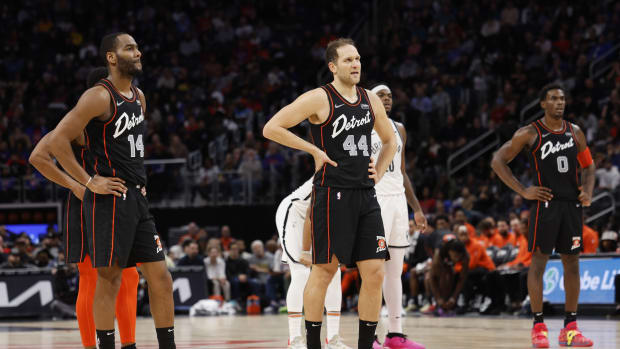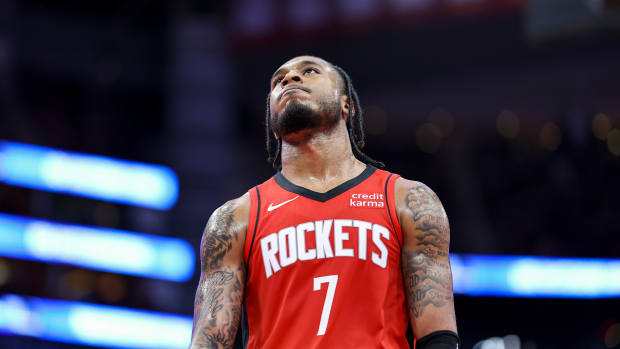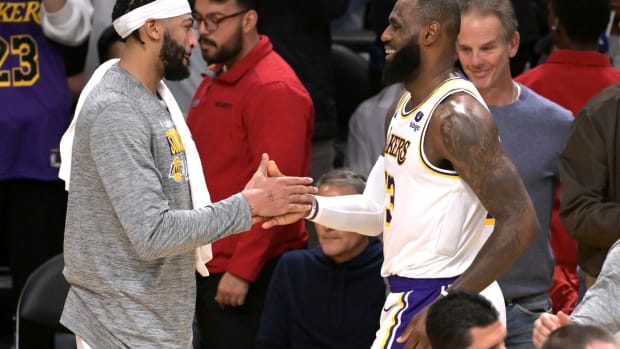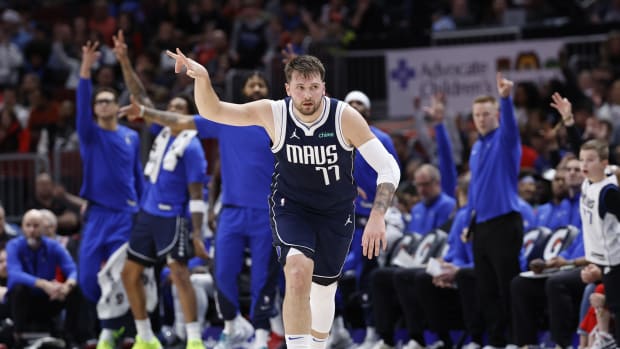Kevin Durant Chooses to Crush the Clippers Rather Than Toy With Them
In the space between Games 2 and 3 of the Warriors’ first-round series against the Clippers, Kevin Durant made the case for calculated deference. “I could definitely shoot over the top and score every time if it’s a one-on-one situation,” Durant told reporters, “but we’ve got a guy who’s dropping and helping, and another guy who’s just waiting on me to dribble the basketball.” Durant estimated he could make 43% of his shots shooting over the top of Patrick Beverley and friends, but to what end? Golden State is a team with larger designs. There isn’t just a warm-and-fuzzy ethic to the way the Warriors operate, but an underlying logic. This is an offense that scored 115 points per 100 possessions in both the regular season and their first two playoff games by leveraging its stars and moving the ball.
“I’m not gonna get in the way of the game because I wanna have a little back and forth with Patrick Beverley,” he explained. “I’m Kevin Durant.” Then, a day after so artfully explaining why pressing to score on a perceived mismatch isn’t always the best basketball play, Durant proceeded to blitz the Clippers in every way possible. They never stood a chance. There would be no historic comeback this time; Golden State built a 31-point lead—like the one they had and lost in Game 2—but kept building. Their advantage topped out at 36 before it was pared down in garbage time, rolling to a 132-105 finish.
Extenuating circumstance had kept Durant from finishing Games 1 and 2. In the series debut, a night of jawing with Beverley caught up to both in the fourth quarter, leading to their ejections. In the course of the Clippers astonishing Game 2 comeback, both competitors managed to foul out. Durant watched the end of Game 3 from the bench for a very different reason: his 38 points on 23 shots—and the roar of Golden State’s broader offense—had ensured that he wouldn’t need to play a single second of the fourth quarter. It took Durant just 30 minutes of playing time to strike within five points of his playoff career high.
It was a brilliant display of all that puts Durant a cut above. Beverley worked the same angles he had all series, but found them lacking when Durant decided there was room to take matters into his own hands. “It wasn’t an adjustment,” Warriors coach Steve Kerr said after the game. “He just had a different mindset tonight than he had the other night and set a tone right away.” Most scorers, by virtue of their limitations, are resigned to take what the defense gives them. Durant has the burden of choice. At any time and against any opponent, he can shimmy or fade into a shot that no defender can touch. That option is always there, a fact thrown into stark relief when the seven-foot Durant is guarded by the 6'1" Beverley.
Where others are pulled into the flow of a game, Durant has to opt in. That alone gives him a different relationship to offense than most every other player in the league. Every choice is conscious: a careful weighing of the shots he could create at any time against the possibilities of a system. It seems unfair to admonish a player for going out of his way to set up his teammates, but basketball has a way of punishing all excesses—even generosity. When one of the greatest scorers in the history of the sport passes his way into nine turnovers, something has gone awry.
Consider the balance restored. The Warriors gave Durant the floor for a statement game without falling out of what they do best. There was still room for Stephen Curry (21 points on 11 shots) to attack and relocate, for Draymond Green (10 assists) to survey the floor, and for Andre Iguodala (15 points in 22 minutes) to swoop in for surgical strikes. Interspersed, however, were the same kinds of touches Durant found in the first two games—only actualized differently. A cleaner transition offense presented better angles. Rather than draw the second defender in the halfcourt, Durant shot over the top of the first, or worked to a spot on the floor where no help could come. Beverley had a hard time bothering Durant’s shot without fouling, which forced Shai Gilgeous-Alexander and Garrett Temple to defend the impossible. Eventually, the Clippers surrendered outright.
Durant has been adamant through the ups and downs of this series that he is only playing within the offense. This is true. Everything the Warriors do is predicated on movement, which is how they ended up with 35 assists—the highest total by any team in these playoffs. But, unselfish as he is, he isn’t Green or Iguodala. He’s Kevin Durant. There is more to him than facilitating, as evidenced by the fact that an entire defense is oriented to his every move. He gets the top perimeter defender and the personalized help scheme. He earns the roving defenders, ready to jump in his path. The Warriors can win on those terms. It just might be less complicated if instead of playing the Clippers’ game, Durant played his.


































